Lowitja Institute Awards
Lowitja Institute celebrates Aboriginal and Torres Strait Islander leadership and excellence throughout our work. As Australia’s national community controlled health and wellbeing research institute, the biennial conference awards recognise outstanding contributions to the field of Aboriginal and Torres Strait Islander health and wellbeing research. These awards showcase research that is culturally, ethically, and intellectually rigorous and for the benefit of Aboriginal and Torres Strait Islander peoples and communities.
Lowitja Institute celebrates Blak excellence in health research
Lowitja Institute presented its 2025 Lowitja Institute Awards during the 4th International Indigenous Health and Wellbeing Conference, on Kaurna Country, South Australia.
As Australia’s national community controlled health and wellbeing research institute, these awards recognise excellence in Aboriginal and Torres Strait Islander health and wellbeing research, community leadership, and innovation.
Congratulations to the following Lowitja Institute Award winners:
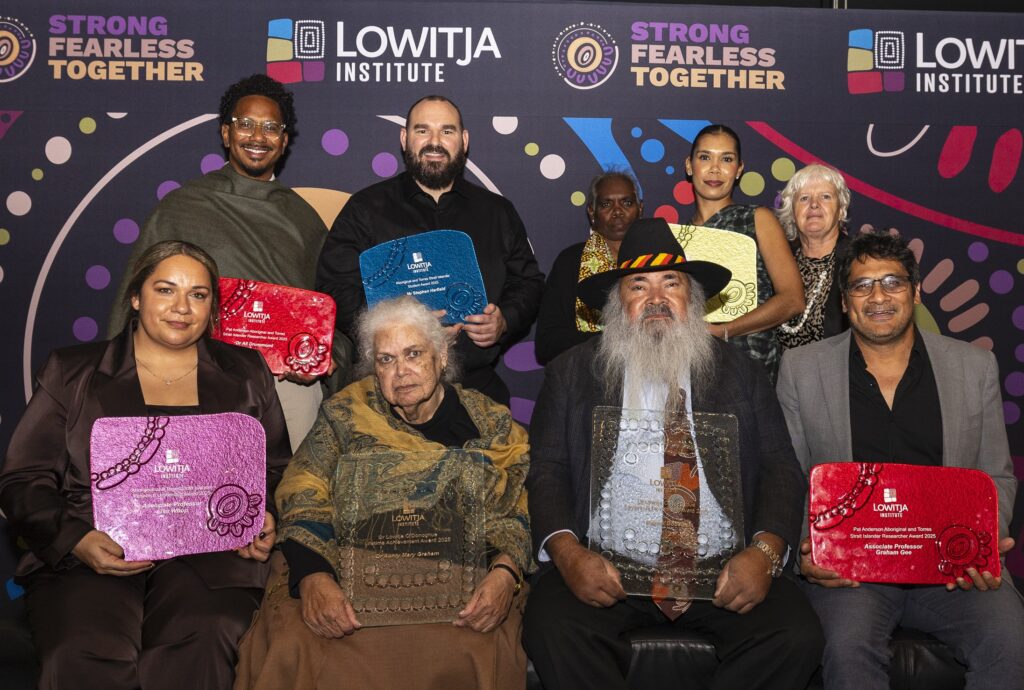
Bottom left to right: Associate Prof. Lisa Whop, Dr Aunty Mary Graham, Uncle Patrick Dodson, Associate Prof. Graham Gee.
Photography by Sia Duff
Lifetime Achievement Award
For outstanding and significant contribution to the health and wellbeing of Aboriginal and Torres Strait Islander peoples.
Dr Aunty Mary Graham
Adjunct Associate Professor Mary Graham is a Kombumerri and Wakka Wakka (wokka wokka) woman acknowledged as one of Australia’s leading Aboriginal philosophers and educators. Aunty Mary has spent more than four decades working across government, community organisations and universities. Aunty Mary has strong ties to the University of Queensland, lecturing on Aboriginal history, politics, and comparative philosophy. Aunty Mary played pivotal roles in establishing SNAICC – National Voice for Our Children, the Council for Aboriginal Reconciliation, and the Australian BlackCard cultural competency program. An accomplished writer and researcher, Aunty Mary co-founded Future Dreaming Australia to foster Indigenous and cross-cultural ecological knowledge.
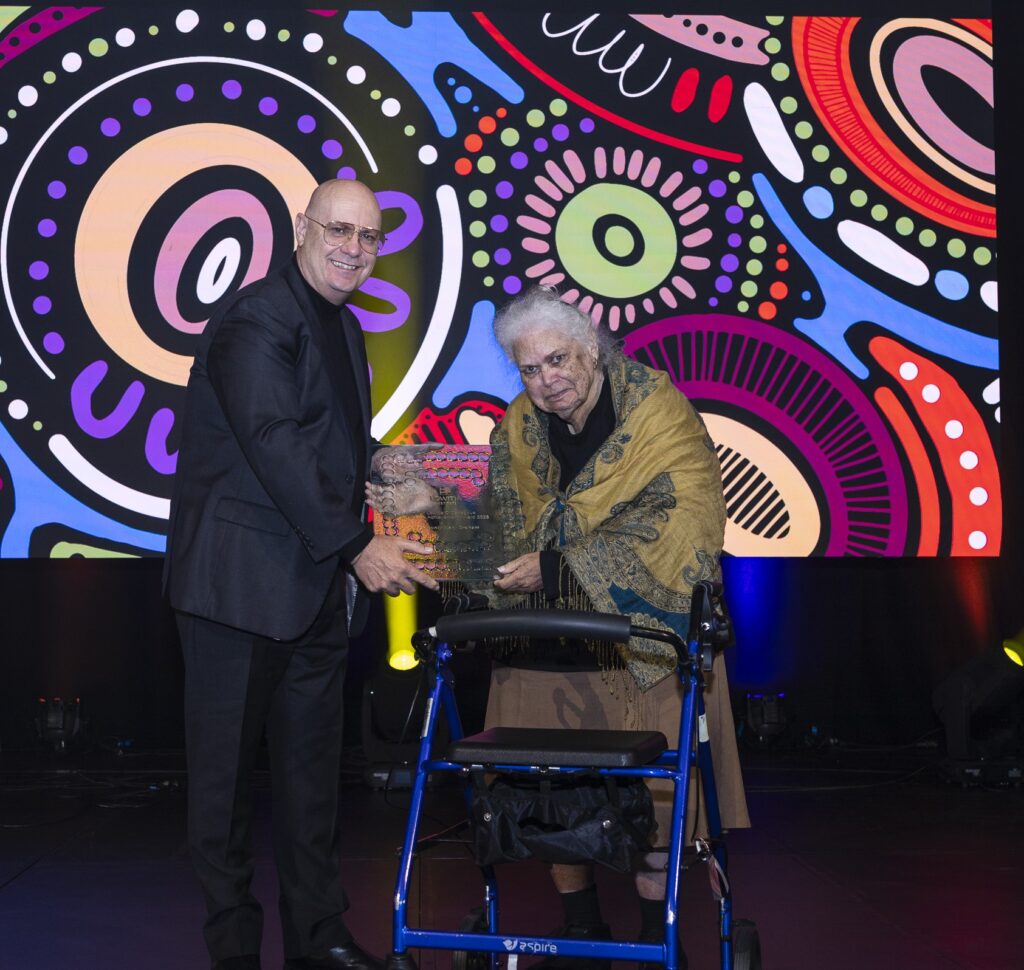
Uncle Patrick Dodson
Mr Patrick Dodson, a Yawuru Elder from Broome, is one of Australia’s most respected Indigenous leaders. Patrick’s public roles have seen him tirelessly advocating for the rights of Aboriginal and Torres Strait Islander peoples. As Central Land Council director in the 1980s, he successfully negotiated for Uluṟu-Kata Tjuṯa National Park’s return to Traditional Owners. As founding chair of the Council for Aboriginal Reconciliation in 1991, he earned the moniker ‘Father of Australian reconciliation’. Other roles have included Commissioner of the Royal Commission into Aboriginal Deaths in Custody, director of the Kimberley Land Council, and Western Australian Labor Senator between 2019 and 2024. At the forefront of Indigenous issues for more than 40 years, Patrick has a heart as big as his famed beard and a legacy that casts a longer shadow than his Akubra.
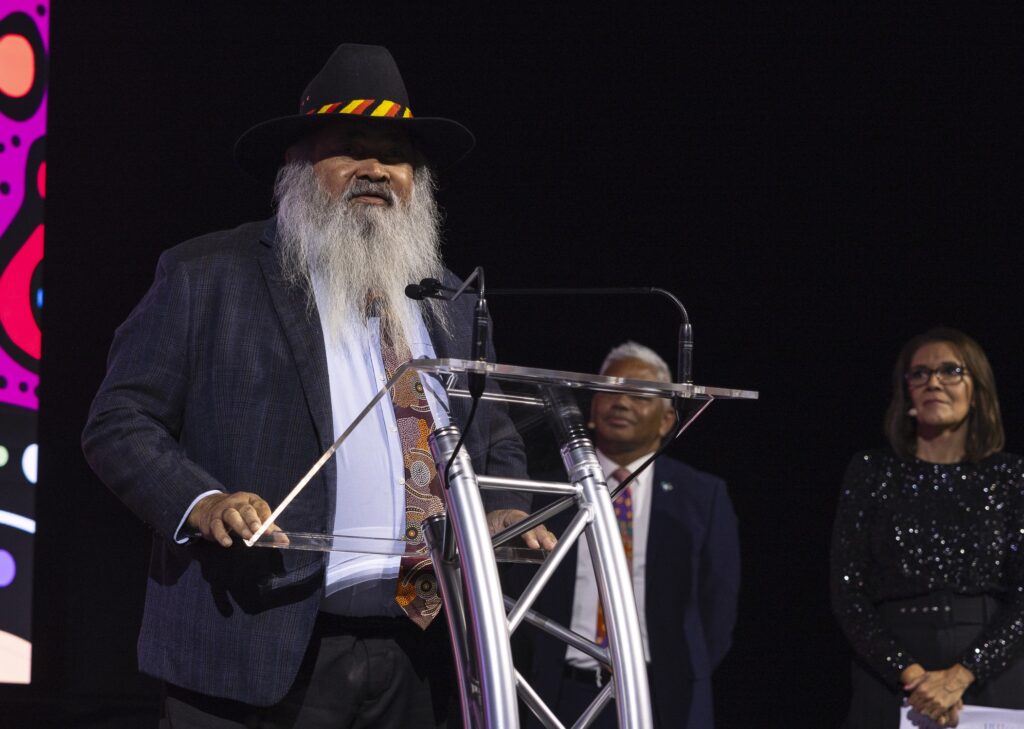
Aboriginal and Torres Strait Islander Research Leadership Award
Recognises Aboriginal and Torres Strait Islander health research leadership and excellence by an Aboriginal and Torres Strait Islander researcher who has made a significant contribution to the health and wellbeing of Australia’s First Peoples.
Associate Professor Lisa Whop
Lisa Whop is a Wagadagam Gumulgal woman from the Torres Strait Islands, Epidemiologist, Associate Research Director and Senior Fellow at Yardhura Walani – the National Centre for Aboriginal and Torres Strait Islander Wellbeing Research, at the Australian National University. Australia’s leading authority on cervical cancer control for Aboriginal and Torres Strait Islander women, Lisa is a Chief investigator on the Centre for Research Excellence on Targeted Approaches to Improve Cancer Services (TACTICS) for Aboriginal and Torres Strait Islander people, where she-leads the Screening and Prevention stream. She is a Principle Investigator on an ARC Discovery Indigenous grant focused on understanding the modifiable factors that influence uptake and completion of HPV vaccination for Aboriginal and Torres Strait Islander adolescents. Lisa’s national and international leadership in cancer screening and prevention has led to the invitation to inform Lung Cancer screening including the Australian Government Program guidelines and shared decision-making tool for the national Lung Cancer Screening program (due to be launched this July).
Pat Anderson Aboriginal and Torres Strait Islander Researcher Award
Named after internationally respected health leader Pat Anderson AO, this award recognises emerging leadership in Aboriginal and Torres Strait Islander health and wellbeing research both inside and outside of the academy.
Associate Professor Graham Gee (community award)
An Aboriginal Chinese man, born on Larrakia country. Graham is a clinical psychologist and worked at the Victorian Aboriginal Health Service in Naarm for 11 years before taking up a position as Senior Research Fellow in the Intergenerational Health group at Murdoch Children’s Research Institute in 2019. Graham’s clinical and academic work has centred around trauma and healing, making significant contributions to informing policy and practice. Graham leads the Intergenerational Health group’s Aboriginal Health Program and is the Co-Director of the Stronger Futures Centre of Research Excellence – Australia’s first national collaborative centre working with Aboriginal and Torres Strait Islander communities and refugee communities to break intergenerational cycles of trauma and social inequity. Graham also leads the Ngagagagee project, which focuses on the experiences and healing needs of Aboriginal and Torres Strait Islander survivors of child sexual abuse in Victoria. Graham was a founding board member of the national Aboriginal and Torres Strait Islander Healing Foundation and also helped establish the Australian Indigenous Psychologists’ Association.
Dr Ali Drummond (academic award)
Ali was born and raised on Weibene (Thursday Island) in north Queensland, and his people are the Meriam (miri-yarm) and Erubam (e-rub) people of Zenadh Kes and the Wuthathi people of Cape York Peninsula. A registered nurse, Ali was a Director of Lowitja Institute for close to a decade before being appointed as the Chief Executive Officer of the Congress of Aboriginal and Torres Strait Islander Nurses and Midwives (CATSINaM), Australia’s peak body for Aboriginal and Torres Strait Islander nurses and midwives. At CATSINAM Ali Co-Leads a Lowitja Institute-funded research project titled ‘The Ume Project: Telling the story of the Torres Model of Care’.
Aboriginal and Torres Strait Islander Student Award
Recognises an Aboriginal or Torres Strait Islander student who has, or is, finishing their studies with a Masters (by research) or PhD postgraduate degree within the nominated timeframe.
Mr Stephen Harfield
Stephen is a Narungga and Ngarrindjeri man from South Australia, a PhD candidate and Senior Research Fellow with the University of Queensland Poche Centre for Indigenous Health. As an epidemiologist and public health researcher, he has worked with Aboriginal communities and organisations across Australia. Stephen received a Lowitja Institute Higher Degree by Research Scholarship and recently submitted his PhD thesis titled ‘Strengthening primary health care for Aboriginal and Torres Strait Islander adolescents living in urban settings’.
Tarrn-doon-nonin Aboriginal and Torres Strait Islander Health Research Project Award
Tarrn-doon-nonin is the Woiwurrung term meaning ‘trust’. This award recognises a research project in Aboriginal and Torres Strait Islander health and wellbeing that has conducted their research to an exemplary standard in line with Aboriginal and Torres Strait Islander ethical principles and practices.
Marninwarntikura Women’s Resource Centre
Marninwarntikura Women’s Resource Centre (MWRC) provides families a place for inspiration, positive change and leadership. The centre supports Fitzroy Valley families by providing mentoring, advocacy, and access to culturally responsive services. The centre received a Lowitja Institute research grant to implement The Bigiswun Kid Project that aimed to identify adolescents’ needs and build knowledge to inform services to improve the health and wellbeing of young people in remote Aboriginal communities. The study findings supported local services to secure additional government funding to establish and implement a place-based social and emotional wellbeing service for young Aboriginal people in the Fitzroy Valley.
Previous winners
Lifetime Achievement Award
Nominated by the Lowitja Institute Board
Winners
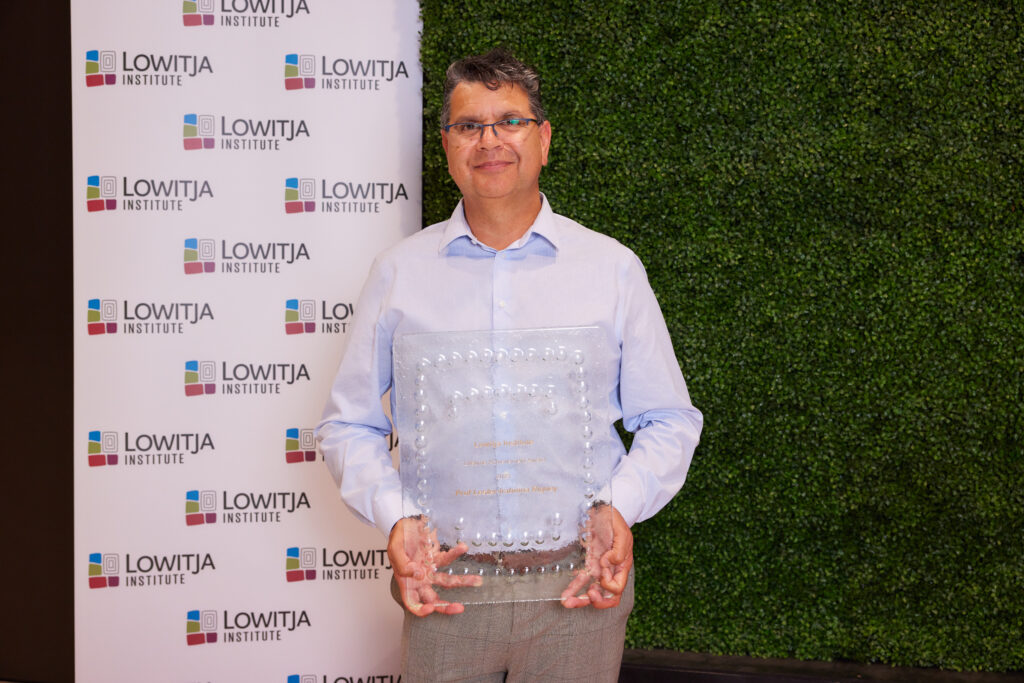
Professor Lester-Irabinna Rigney, a descendant of the Narungga, Kaurna and Ngarrindjeri peoples of South Australia. He is esteemed Professor of Education and Co-Chair of the Pedagogies for Justice Research group in the Centre for Research in Educational and Social Inclusion, based in the Education Futures, Academic Unit at the University of South Australia. He is Distinguished Fellow at Deakin University and previous Distinguished Fellow at Kings College, London.
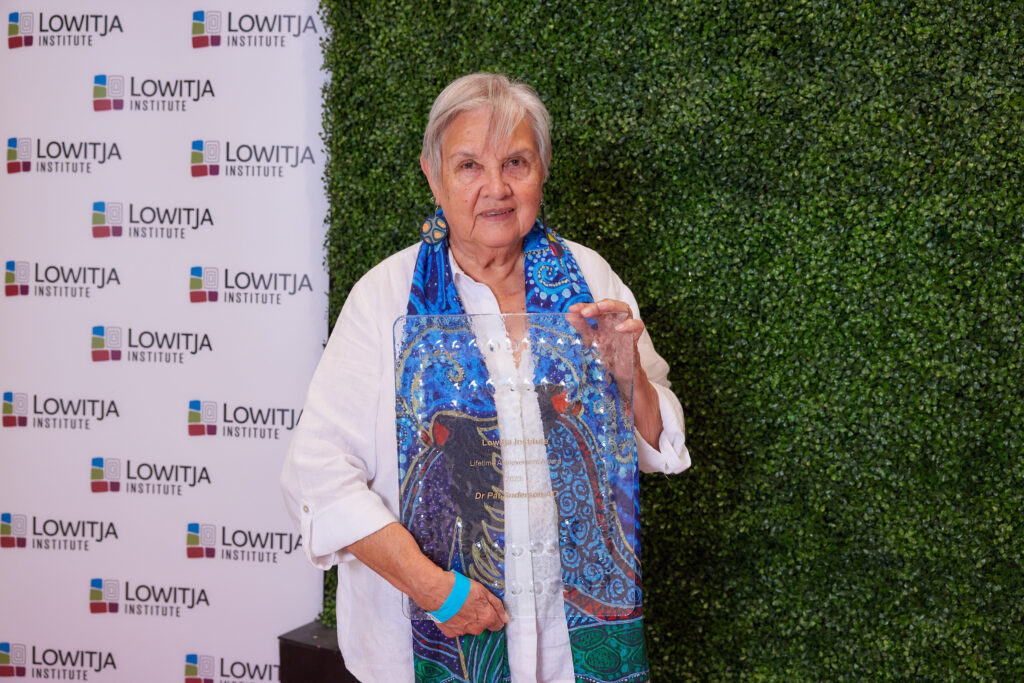
Pat Anderson AO, an Alyawarre woman known nationally and internationally as a powerful advocate for the health of Australia’s First Peoples. She has extensive experience in Aboriginal health, including community development, policy formation and research ethics. Dr Anderson was appointed Officer of the Order of Australia (AO) in 2014 for distinguished service to the Indigenous community as a social justice advocate, particularly through promoting improved health, and educational and protection outcomes for children.
The Lowitja Institute Lifetime Achievement Award is given to an individual who has made an outstanding and significant contribution to the health and wellbeing of Aboriginal and Torres Strait Islander peoples. Lowitja Institute’s Board of Directors nominates outstanding individuals in this field.
The inaugural 2016 award was given posthumously to Mr Tiga Bayles. The 2019 winner was Professor Yvonne Cadet-James.
Cranlana Award
Winners
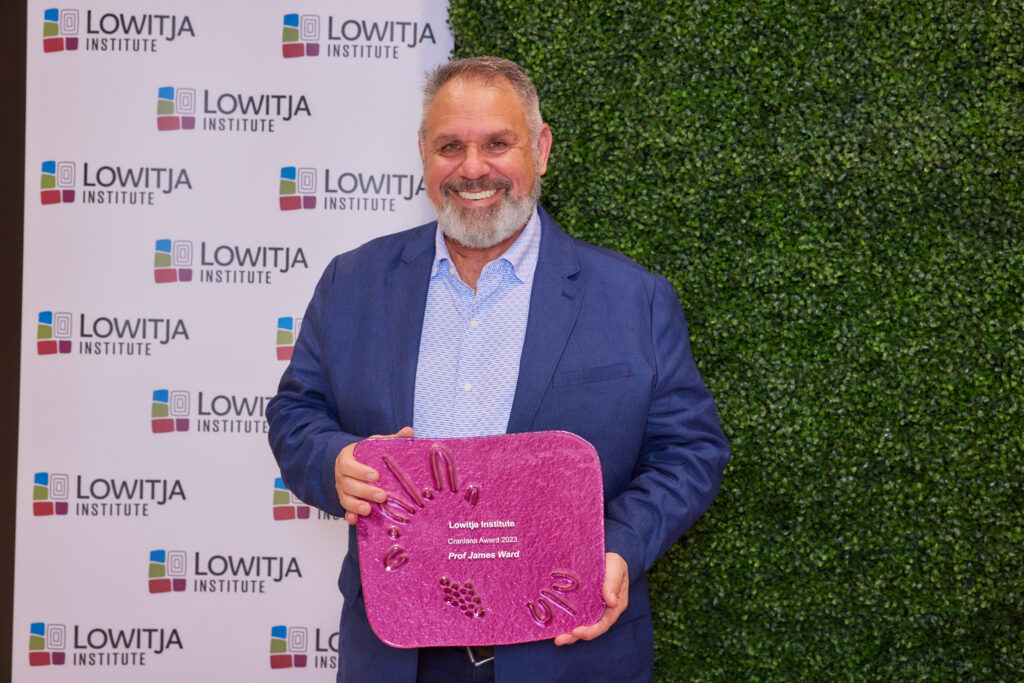
Professor James Ward, a descendent of the Pitjantjatjara and Nurrunga clans of central and southern Australia and Director of the Poche Centre for Indigenous Health at the University of Queensland.
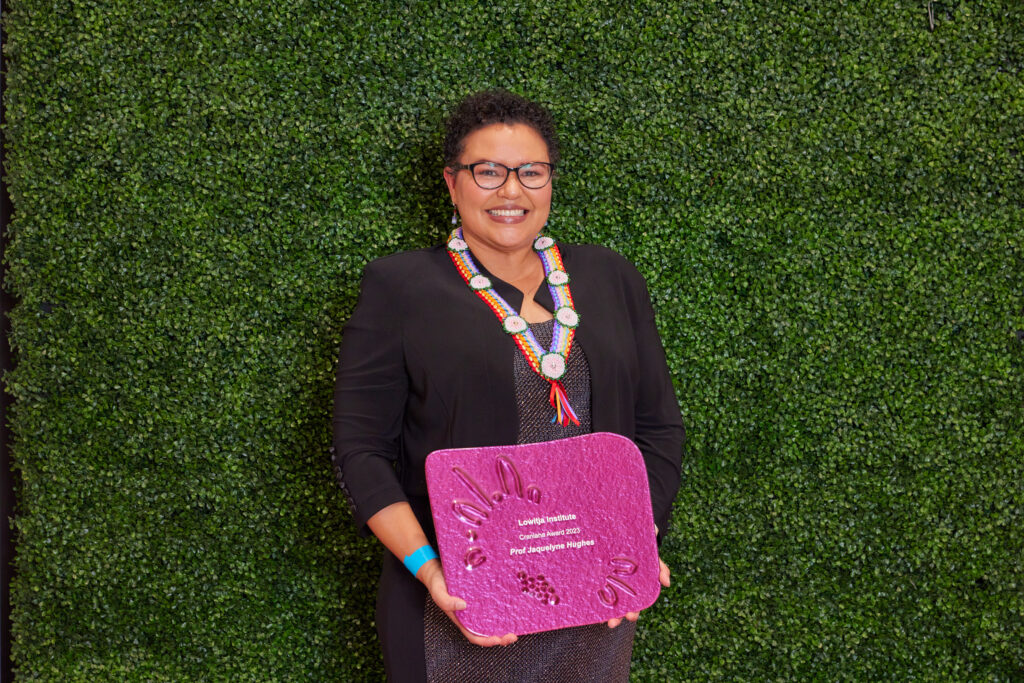
Professor Jaquelyne Hughes, a Gumugul Woman of Wagadagam tribe, Mabuiag Island in Torres Strait, living on Larrakia Country. Professor Hughes is a nephrologist and inaugural Clinical Research Professor in Aboriginal and Torres Strait Islander Health Advancement at Flinders University.
Given in partnership with the Cranlana Centre for Ethical Leadership, the Cranlana Award celebrates excellence in research leadership by an Aboriginal and Torres Strait Islander researcher who has made a significant contribution to the health and wellbeing of Australia’s Aboriginal and Torres Strait Islander peoples.
This award was previously known as the Research Leadership Award (Cranlana Award). Past winners include Professor Roianne West (2020), Professor Catherine Chamberlain (2019), Professor Ray Lovett (2018), Professor Gail Garvey (2016), and Professor Sandra Eades (2015).
Aboriginal and Torres Strait Islander Student Award
Winner
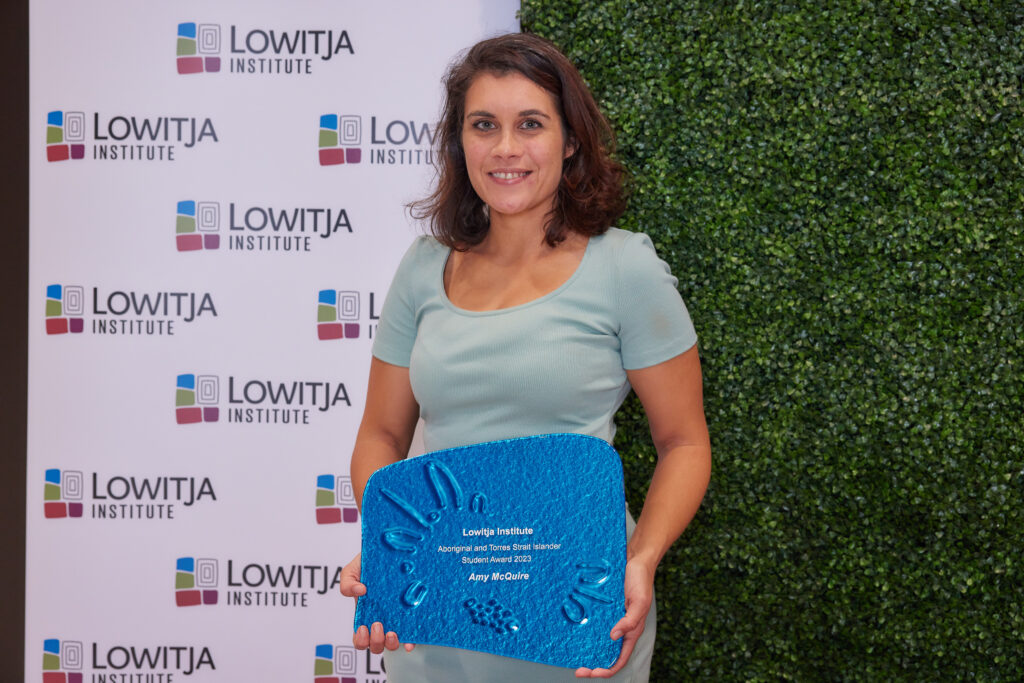
Ms Amy McQuire, a Dharumbal and South Sea Islander woman, and award-winning journalist who has recently submitted her PhD thesis titled ‘Speaking to Silences: MediaRepresentations of Violence Against Aboriginal Women’.
This award recognises an Aboriginal or Torres Strait Islander student who has, or is, finishing their studies with a Masters by research or doctorate within the nominated timeframe.
In 2019, this award was given to Associate Professor Michelle Kennedy (previous name Michelle Bovill). Previous winners include Associate Professor Lisa Whop (2016), Dr Stewart Sutherland (2014), and Professor Ray Lovett (2012).
Pat Anderson Aboriginal and Torres Strait Islander Researcher Award
Winners
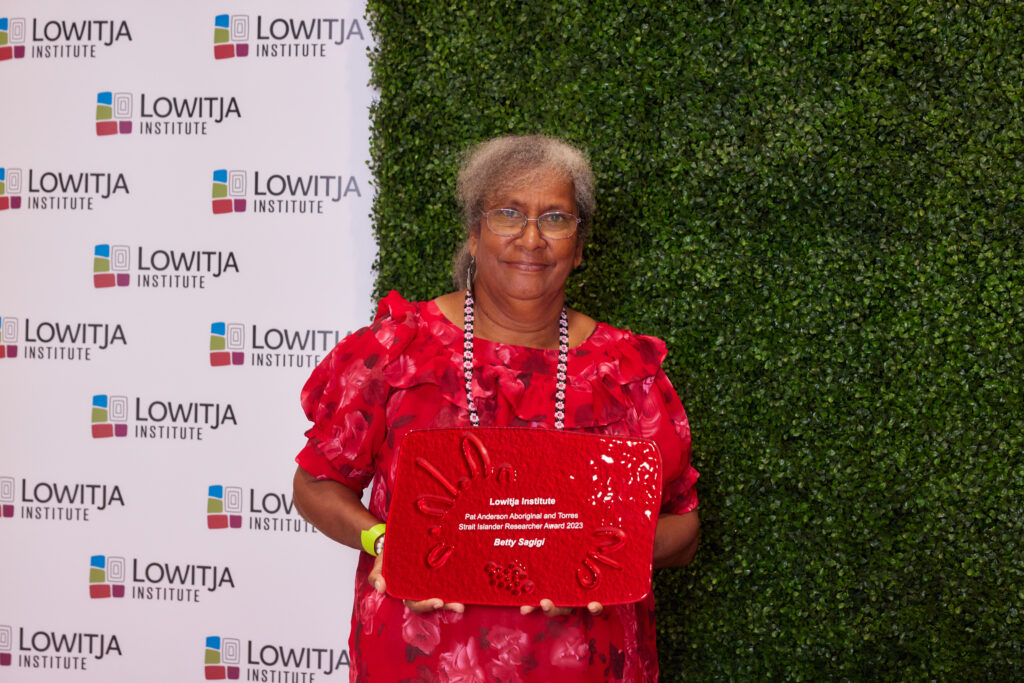
Associate Professor Odette Pearson, a Kuku Yalanji/Torres Strait Islander woman who was awarded her PhD in 2013. She is Co-Theme leader and Population Health Platform lead in the Wardliparingga Aboriginal Health Equity Theme, at SAHMRI and adjunct Associate Professor at the University of Adelaide.
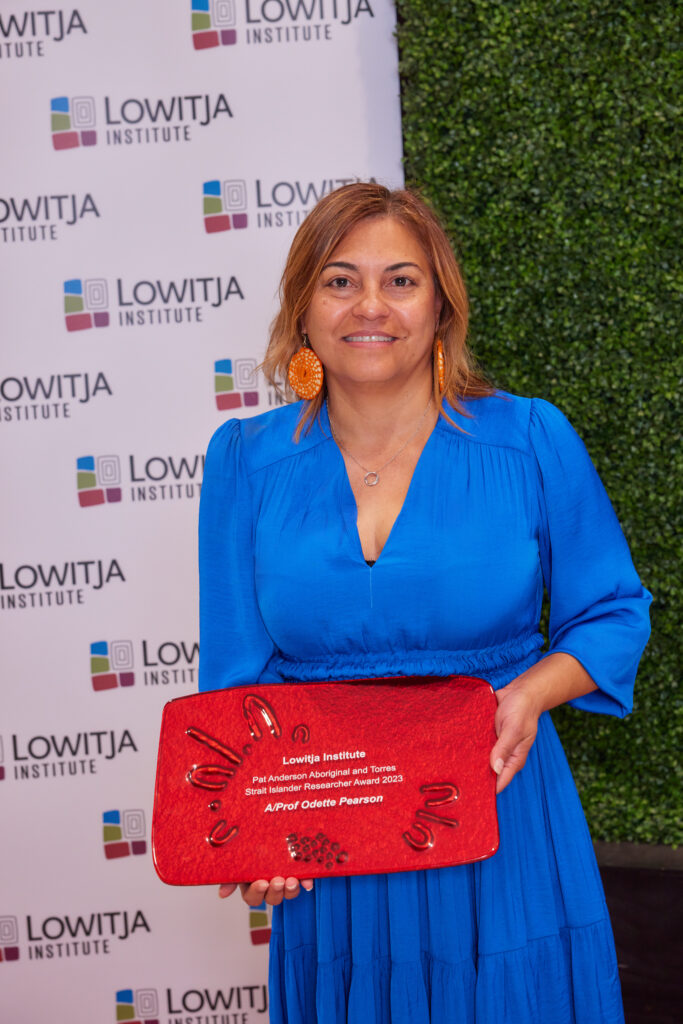
Mrs Betty Sagigi, a Torres Strait Islander Health Worker within the Torres and Cape Hospital and Health Service. She is the Aged Care Assessment Team Coordinator and Assessor for the Torres Strait, working as part of Thursday Island’s Primary Health Post-Acute Rehab and Aged Care Program.
The Pat Anderson Award recognises emerging leadership in Aboriginal and Torres Strait Islander health and wellbeing research. This award is named after internationally respected health leader, Pat Anderson AO, an Alyawarre woman and powerful advocate for the health of Aboriginal and Torres Strait Islander peoples and first peoples globally.
This award was previously known as the Emerging Aboriginal and Torres Strait Islander Research Award. Previous winners include Associate Professor Kalinda Griffiths (2019), Associate Professor Roxanne Bainbridge (2016), Dr Simon Graham (2014), and Professor Chelsea Bond (2012).
Tarrn-doon-nonin Aboriginal and Torres Strait Islander Health Research Ethics Award
Winner
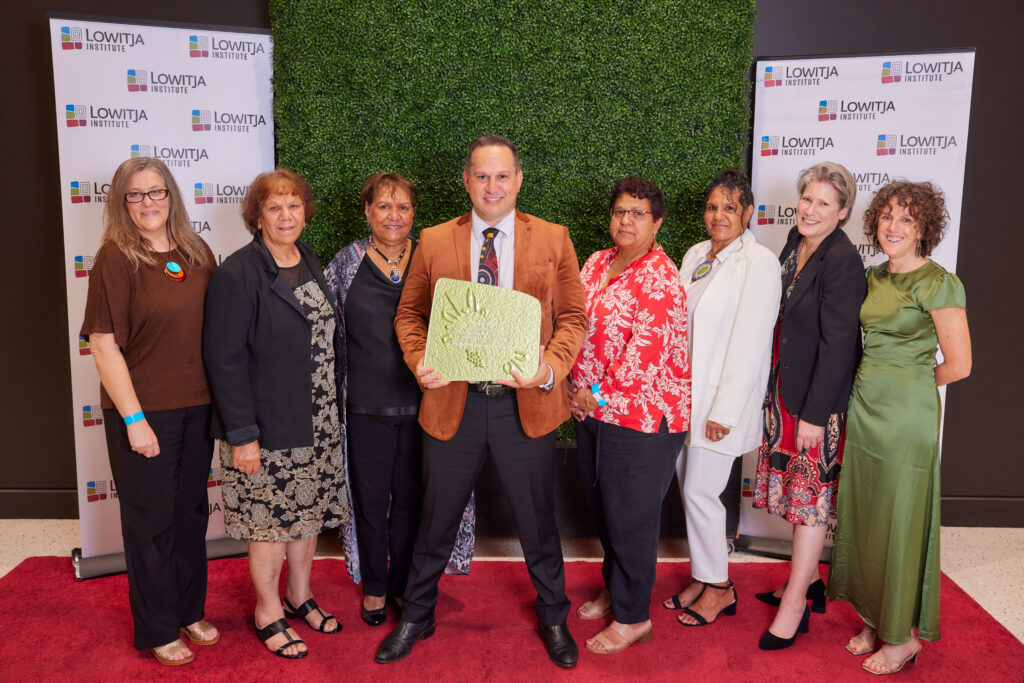
Wungening Aboriginal Corporation: The Birdiya Maya project is a partnership between Wungening Aboriginal Corporation and the National Drug Research Institute to conduct community-led research, focused on elevating the voices of Aboriginal people experiencing homelessness. The project is guided by a Community Ownership Group (COG) of 15 Elders, as co-researchers.
Tarrn-doon-nonin is the Woiwurrung term for ‘trust’. This award recognises a research project in Aboriginal and Torres Strait Islander health and wellbeing that was conducted to an exemplary standard in line with Aboriginal and Torres Strait Islander ethical principles and practices.
Previous winners include Mr John Singer, Dr Rosie King, and Ms Janet Stajic for their work at the Aboriginal Health Council of South Australia. The 2019 winner was Ŋuthanmaram djamarrkuḻiny’ märrma’kurr romgurr: Growing up children in two worlds.
Read more
Lowitja Institute honours outstanding Aboriginal and Torres Strait Islander researchers, June 2023

